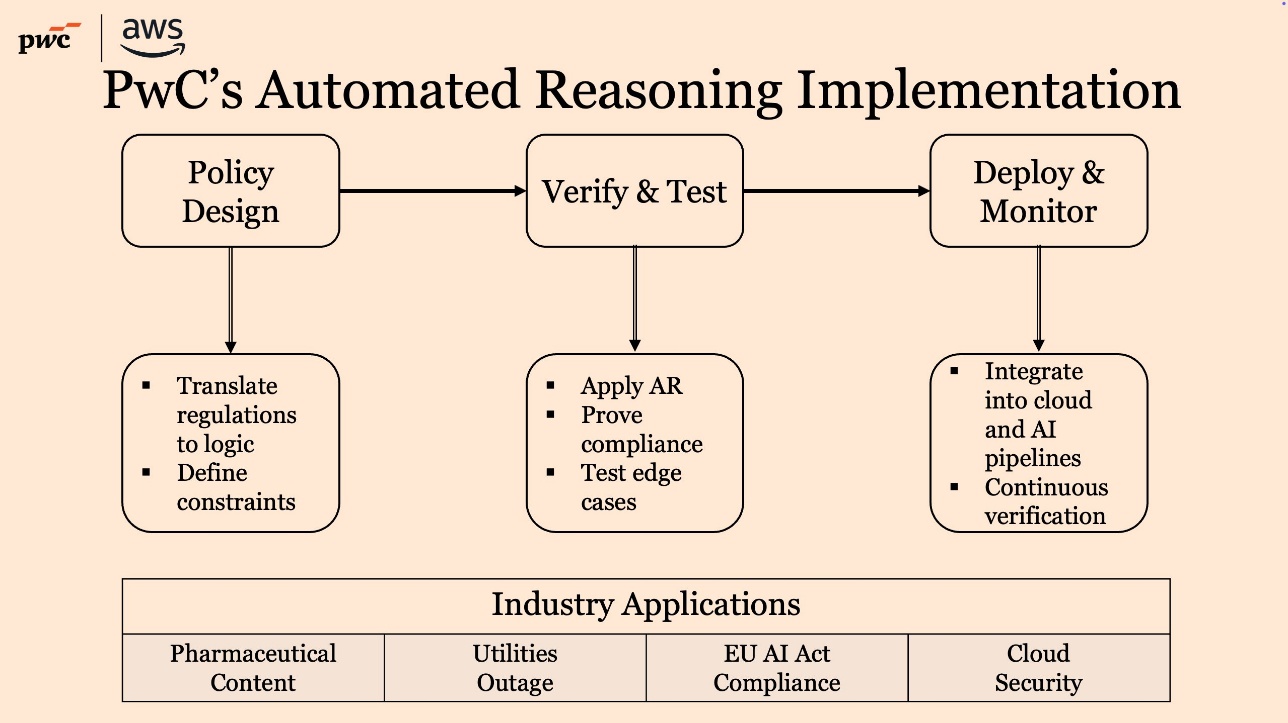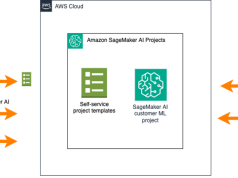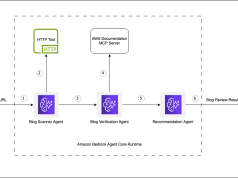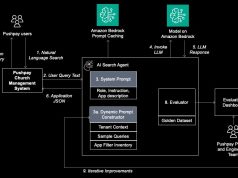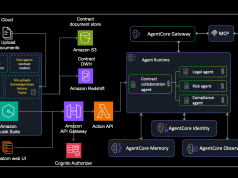This is a guest post co-written with Scott Likens, Ambuj Gupta, Adam Hood, Chantal Hudson, Priyanka Mukhopadhyay, Deniz Konak Ozturk, and Kevin Paul from PwC
Organizations are deploying generative AI solutions while balancing accuracy, security, and compliance. In this globally competitive environment, scale matters less, speed matters more, and innovation matters most of all, according to recent PwC 2025 business insights on AI agents. To maintain a competitive advantage, organizations must support rapid deployment and verifiable trust in AI outputs. Particularly within regulated industries, mathematical verification of results can transform the speed of innovation from a potential risk into a competitive advantage.
This post presents how AWS and PwC are developing new reasoning checks that combine deep industry expertise with Automated Reasoning checks in Amazon Bedrock Guardrails to support innovation. Automated Reasoning is a branch of AI focused on algorithmic search for mathematical proofs. Automated Reasoning checks in Amazon Bedrock Guardrails, which encode knowledge into formal logic to validate if large language models (LLM) outputs are possible, are generally available as of August 6, 2025.
This new guardrail policy maintains accuracy within defined parameters, unlike traditional probabilistic reasoning methods. The system evaluates AI-generated content against rules derived from policy documents, including company guidelines and operational standards. Automated Reasoning checks produce findings that provide insights into whether the AI-generated content aligns with the rules extracted from the policy, highlights ambiguity that exists in the content, and provides suggestions on how to remove assumptions.
“In a field where breakthroughs are happening at incredible speed, reasoning is one of the most important technical advances to help our joint customers succeed in generative AI,” says Matt Wood, Global CTIO at PwC, at AWS Re:Invent 2024.
Industry-transforming use cases using Amazon Bedrock Automated Reasoning checks
The strategic alliance combining PwC’s proven, deep expertise and the innovative technology from AWS is set to transform how businesses approach AI-driven innovation. The following diagram illustrates PWC’s Automated Reasoning implementation. We initially focus on highly regulated industries such as pharmaceuticals, financial services, and energy.
In the following sections, we present three groundbreaking use cases developed by PwC teams.
EU AI Act compliance for financial services risk management
The European Union (EU) AI Act requires organizations to classify and verify all AI applications according to specific risk levels and governance requirements. PwC has developed a practical approach to address this challenge using Automated Reasoning checks in Amazon Bedrock Guardrails, which transforms EU AI Act compliance from a manual burden into a systematic, verifiable process. Given a description of an AI application’s use case, the solution converts risk classification criteria into defined guardrails, enabling organizations to consistently assess and monitor AI applications while supporting expert human judgment through automated compliance verification with auditable artifacts.The key benefits of using Automated Reasoning checks include:
- Automated classification of AI use cases into risk categories
- Verifiable logic trails for AI-generated classifications
- Enhanced speed in identifying the required governance controls
The following diagram illustrates the workflow for this use case.
Pharmaceutical content review
PwC’s Regulated Content Orchestrator (RCO) is a globally scalable, multi-agent capability—powered by a core rules engine customized to company, region, product, and indication for use—that automates medical, legal, regulatory, and brand compliance. The RCO team was an early incubating collaborator of Amazon Bedrock Automated Reasoning checks, implementing it as a secondary validation layer in the marketing content generation process. This enhanced defense strengthened existing content controls, resulting in accelerated content creation and review processes while enhancing compliance standards.Key benefits of Automated Reasoning Checks in Amazon Bedrock Guardrails include:
- Applies automated, mathematically based safeguards for verifying RCO’s analysis
- Enables transparent QA with traceable, audit-ready reasoning
- Safeguards against potentially unsupported or hallucinated outputs
The following diagram illustrates the workflow for this use case.
Utility outage management for real-time decision support
Utility outage management applies Automated Reasoning checks in Amazon Bedrock Guardrails to enhance response times and operational efficiency of utility companies. The solution can generate standardized protocols from regulatory guidelines, creates procedures based on NERC and FERC requirements, and verifies AI-produced outage classifications. Through an integrated cloud-based architecture, this solution applies severity-based verification workflows to dispatch decisions—normal outages (3-hour target) assign tickets to available crews, medium severity (6-hour target) triggers expedited dispatch, and critical incidents (12-hour target) activate emergency procedures with proactive messaging.
The key benefits of using Automated Reasoning checks include:
- Effective and enhanced responses to customers
- Real-time operational insights with verified regulatory alignment
- Accelerated decision-making with mathematical certainty
The following diagram illustrates the workflow for this use case.
Looking ahead
As the adoption of AI continues to evolve, particularly with agentic AI, the AWS and PwC alliance is focused on the following:
- Expanding Automated Reasoning checks integrated solutions across more industries
- Developing industry-specific agentic AI solutions with built-in compliance verification
- Enhancing explainability features to provide greater transparency
Conclusion
The integration of Automated Reasoning checks in Amazon Bedrock Guardrails with PwC’s deep industry expertise offers a powerful avenue to help deploy AI-based solutions. As an important component of responsible AI, Automated Reasoning checks provides safeguards that help improve the trustworthiness of AI applications. With the expectation of mathematical certainty and verifiable trust in AI outputs, organizations can now innovate without compromising on accuracy, security, or compliance. To learn more about how Automated Reasoning checks works, refer to Minimize AI hallucinations and deliver up to 99% verification accuracy with Automated Reasoning checks: Now available and Improve accuracy by adding Automated Reasoning checks in Amazon Bedrock Guardrails.
Explore how Automated Reasoning checks in Amazon Bedrock can improve the trustworthiness of your generative AI applications. To learn more about using this capability or to discuss custom solutions for your specific needs, contact your AWS account team or an AWS Solutions Architect. Contact the PwC team to learn how you can use the combined power of AWS and PwC to drive innovation in your industry.
About the authors
 Nafi Diallo is a Senior Automated Reasoning Architect at Amazon Web Services, where she advances innovations in AI safety and Automated Reasoning systems for generative AI applications. Her expertise is in formal verification methods, AI guardrails implementation, and helping global customers build trustworthy and compliant AI solutions at scale. She holds a PhD in Computer Science with research in automated program repair and formal verification, and an MS in Financial Mathematics from WPI.
Nafi Diallo is a Senior Automated Reasoning Architect at Amazon Web Services, where she advances innovations in AI safety and Automated Reasoning systems for generative AI applications. Her expertise is in formal verification methods, AI guardrails implementation, and helping global customers build trustworthy and compliant AI solutions at scale. She holds a PhD in Computer Science with research in automated program repair and formal verification, and an MS in Financial Mathematics from WPI.
 Adewale Akinfaderin is a Sr. Data Scientist–Generative AI, Amazon Bedrock, where he contributes to cutting edge innovations in foundational models and generative AI applications at AWS. His expertise is in reproducible and end-to-end AI/ML methods, practical implementations, and helping global customers formulate and develop scalable solutions to interdisciplinary problems. He has two graduate degrees in physics and a doctorate in engineering.
Adewale Akinfaderin is a Sr. Data Scientist–Generative AI, Amazon Bedrock, where he contributes to cutting edge innovations in foundational models and generative AI applications at AWS. His expertise is in reproducible and end-to-end AI/ML methods, practical implementations, and helping global customers formulate and develop scalable solutions to interdisciplinary problems. He has two graduate degrees in physics and a doctorate in engineering.
 Bharathi Srinivasan is a Generative AI Data Scientist at the AWS Worldwide Specialist Organization. She works on developing solutions for Responsible AI, focusing on algorithmic fairness, veracity of large language models, and explainability. Bharathi guides internal teams and AWS customers on their responsible AI journey. She has presented her work at various learning conferences.
Bharathi Srinivasan is a Generative AI Data Scientist at the AWS Worldwide Specialist Organization. She works on developing solutions for Responsible AI, focusing on algorithmic fairness, veracity of large language models, and explainability. Bharathi guides internal teams and AWS customers on their responsible AI journey. She has presented her work at various learning conferences.
 Dan Spillane, a Principal at Amazon Web Services (AWS), leads global strategic initiatives in the Consulting Center of Excellence (CCOE). He works with customers and partners to solve their critical business challenges using innovative technologies. Dan specializes in generative AI and responsible AI, including automated reasoning. He applies these tools to deliver measurable business value at scale. As a lifelong learner, Dan actively studies global cultures and business mechanisms, which enhances his ability to mentor others and drive cross-cultural initiatives.
Dan Spillane, a Principal at Amazon Web Services (AWS), leads global strategic initiatives in the Consulting Center of Excellence (CCOE). He works with customers and partners to solve their critical business challenges using innovative technologies. Dan specializes in generative AI and responsible AI, including automated reasoning. He applies these tools to deliver measurable business value at scale. As a lifelong learner, Dan actively studies global cultures and business mechanisms, which enhances his ability to mentor others and drive cross-cultural initiatives.
 Aartika Sardana Chandras is a Senior Product Marketing Manager for AWS Generative AI solutions, with a focus on Amazon Bedrock. She brings over 15 years of experience in product marketing, and is dedicated to empowering customers to navigate the complexities of the AI lifecycle. Aartika is passionate about helping customers leverage powerful AI technologies in an ethical and impactful manner.
Aartika Sardana Chandras is a Senior Product Marketing Manager for AWS Generative AI solutions, with a focus on Amazon Bedrock. She brings over 15 years of experience in product marketing, and is dedicated to empowering customers to navigate the complexities of the AI lifecycle. Aartika is passionate about helping customers leverage powerful AI technologies in an ethical and impactful manner.
 Rama Lankalapalli is a Senior Partner Solutions Architect (PSA) at AWS where he leads a global team of PSAs supporting PwC, a major global systems integrator. Working closely with PwC’s global practice he champions enterprise cloud adoption by leveraging the breadth and depth of AWS services across migrations, modernization, security, AI/ML, and analytics. Rama architects scalable solutions that help organizations accelerate their digital transformation while delivering measurable business outcomes. His leadership combines deep technical expertise with strategic insight to drive customer success through innovative, industry-specific cloud solutions.
Rama Lankalapalli is a Senior Partner Solutions Architect (PSA) at AWS where he leads a global team of PSAs supporting PwC, a major global systems integrator. Working closely with PwC’s global practice he champions enterprise cloud adoption by leveraging the breadth and depth of AWS services across migrations, modernization, security, AI/ML, and analytics. Rama architects scalable solutions that help organizations accelerate their digital transformation while delivering measurable business outcomes. His leadership combines deep technical expertise with strategic insight to drive customer success through innovative, industry-specific cloud solutions.
 Scott Likens serves as the Chief AI Engineer over Global and US teams at PwC and leads the AI Engineering and Emerging Technology R&D teams domestically, driving the firm’s strategy around AI, Blockchain, VR, Quantum Computing, and other disruptors. With over 30 years of emerging technology expertise, he has helped clients transform customer experience, digital strategy, and operations for various industries.
Scott Likens serves as the Chief AI Engineer over Global and US teams at PwC and leads the AI Engineering and Emerging Technology R&D teams domestically, driving the firm’s strategy around AI, Blockchain, VR, Quantum Computing, and other disruptors. With over 30 years of emerging technology expertise, he has helped clients transform customer experience, digital strategy, and operations for various industries.
 Ambuj Gupta is a Director in PwC’s AI and Digital Contacts & Service practice, based in Chicago. With over 15 years of experience, Ambuj brings deep expertise in Artificial Intelligence, Agentic and Generative AI, Digital Contact Solutions, and Cloud Innovation across a broad spectrum of platforms and industries. He is recognized for driving strategic transformation through Cloud Native AI Automation and emerging technologies—including GenAI-powered agents, Intelligent Agent Assists, and Customer Data Platforms—to enhance channel performance and employee effectiveness.
Ambuj Gupta is a Director in PwC’s AI and Digital Contacts & Service practice, based in Chicago. With over 15 years of experience, Ambuj brings deep expertise in Artificial Intelligence, Agentic and Generative AI, Digital Contact Solutions, and Cloud Innovation across a broad spectrum of platforms and industries. He is recognized for driving strategic transformation through Cloud Native AI Automation and emerging technologies—including GenAI-powered agents, Intelligent Agent Assists, and Customer Data Platforms—to enhance channel performance and employee effectiveness.
 Adam Hood is a Partner and AWS Data and AI Leader at PwC US. As a strategic and results-oriented technology leader, Adam specializes in driving enterprise-wide transformation and unlocking business value through the strategic application of digital systems, data, and GenAI/AI/ML including building agentic workflows. With a track record of success in industry and consulting, he has guided organizations through complex digital, finance, and ERP modernizations, from initial strategy and business case development to seamless execution and global rollout.
Adam Hood is a Partner and AWS Data and AI Leader at PwC US. As a strategic and results-oriented technology leader, Adam specializes in driving enterprise-wide transformation and unlocking business value through the strategic application of digital systems, data, and GenAI/AI/ML including building agentic workflows. With a track record of success in industry and consulting, he has guided organizations through complex digital, finance, and ERP modernizations, from initial strategy and business case development to seamless execution and global rollout.
 Chantal Hudson is a Manager in PwC UK’s AI and Modelling team. She has been with PwC for just over five years, starting her career in the South African firm. Chantal works primarily with large banks on credit risk modelling, and is particularly interested in the application of AI applying AI to advance modelling practices.
Chantal Hudson is a Manager in PwC UK’s AI and Modelling team. She has been with PwC for just over five years, starting her career in the South African firm. Chantal works primarily with large banks on credit risk modelling, and is particularly interested in the application of AI applying AI to advance modelling practices.
 Priyanka Mukhopadhyay is a Manager in PwC’s Cloud and Digital Engineering practice. She is an AWS Certified Solution Architect – Associate with over 13 years of experience in Data Engineering. Over the past decade, she has honed her expertise in AWS services and has more than 12 years of experience in developing and delivering robust projects following Agile Methodologies.
Priyanka Mukhopadhyay is a Manager in PwC’s Cloud and Digital Engineering practice. She is an AWS Certified Solution Architect – Associate with over 13 years of experience in Data Engineering. Over the past decade, she has honed her expertise in AWS services and has more than 12 years of experience in developing and delivering robust projects following Agile Methodologies.
 Deniz Konak Ozturk is a Senior Manager within PwC’s AI &Modelling team. She has around 15 years of experience in AI/Gen AI and traditional model development, implementation and validation across UK and EU/non-EU territories and compliance assessment with EU regulations as well as IFRS9 audits. Over the past 6 years, her focus has been primarily on AI/Gen AI, highlighted by her involvement in AI Validation framework development, implementation of this framework into different clients, product management for an automated ML platform, and leading research and product ownership in an R&D initiative on Alternative Data Usage for ML based Risk Models targeting the financially underserved segment.
Deniz Konak Ozturk is a Senior Manager within PwC’s AI &Modelling team. She has around 15 years of experience in AI/Gen AI and traditional model development, implementation and validation across UK and EU/non-EU territories and compliance assessment with EU regulations as well as IFRS9 audits. Over the past 6 years, her focus has been primarily on AI/Gen AI, highlighted by her involvement in AI Validation framework development, implementation of this framework into different clients, product management for an automated ML platform, and leading research and product ownership in an R&D initiative on Alternative Data Usage for ML based Risk Models targeting the financially underserved segment.
 Kevin Paul is a Director within the AI Engineering group at PwC. He specializes in Applied AI, and has extensive of experience across the AI lifecycle, building and maintaining solutions across industries.
Kevin Paul is a Director within the AI Engineering group at PwC. He specializes in Applied AI, and has extensive of experience across the AI lifecycle, building and maintaining solutions across industries.

